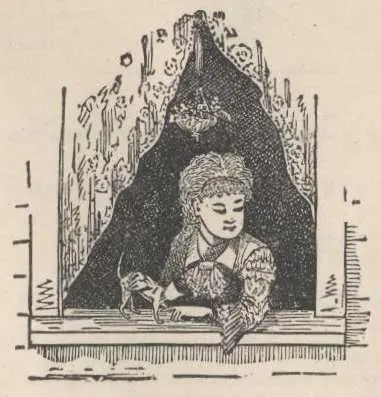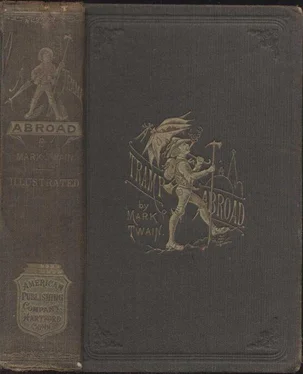Mark Twain - A Tramp Abroad
Здесь есть возможность читать онлайн «Mark Twain - A Tramp Abroad» весь текст электронной книги совершенно бесплатно (целиком полную версию без сокращений). В некоторых случаях можно слушать аудио, скачать через торрент в формате fb2 и присутствует краткое содержание. Жанр: Классическая проза, Юмористическая проза, на английском языке. Описание произведения, (предисловие) а так же отзывы посетителей доступны на портале библиотеки ЛибКат.
- Название:A Tramp Abroad
- Автор:
- Жанр:
- Год:неизвестен
- ISBN:нет данных
- Рейтинг книги:5 / 5. Голосов: 1
-
Избранное:Добавить в избранное
- Отзывы:
-
Ваша оценка:
- 100
- 1
- 2
- 3
- 4
- 5
A Tramp Abroad: краткое содержание, описание и аннотация
Предлагаем к чтению аннотацию, описание, краткое содержание или предисловие (зависит от того, что написал сам автор книги «A Tramp Abroad»). Если вы не нашли необходимую информацию о книге — напишите в комментариях, мы постараемся отыскать её.
A Tramp Abroad — читать онлайн бесплатно полную книгу (весь текст) целиком
Ниже представлен текст книги, разбитый по страницам. Система сохранения места последней прочитанной страницы, позволяет с удобством читать онлайн бесплатно книгу «A Tramp Abroad», без необходимости каждый раз заново искать на чём Вы остановились. Поставьте закладку, и сможете в любой момент перейти на страницу, на которой закончили чтение.
Интервал:
Закладка:
Freundschaftsbezeigungen.
Dilettantenaufdringlichkeiten.
Stadtverordnetenversammlungen.
These things are not words, they are alphabetical processions. And they are not rare; one can open a German newspaper at any time and see them marching majestically across the page—and if he has any imagination he can see the banners and hear the music, too. They impart a martial thrill to the meekest subject. I take a great interest in these curiosities. Whenever I come across a good one, I stuff it and put it in my museum. In this way I have made quite a valuable collection. When I get duplicates, I exchange with other collectors, and thus increase the variety of my stock. Here are some specimens which I lately bought at an auction sale of the effects of a bankrupt bric-a-brac hunter:
Generalstaatsverordnetenversammlungen.
Alterthumswissenschaften.
Kinderbewahrungsanstalten.
Unabhängigkeitserklärungen.
Wiedererstellungbestrebungen.
Waffenstillstandsunterhandlungen.

Of course when one of these grand mountain ranges goes stretching across the printed page, it adorns and ennobles that literary landscape—but at the same time it is a great distress to the new student, for it blocks up his way; he cannot crawl under it, or climb over it, or tunnel through it. So he resorts to the dictionary for help, but there is no help there. The dictionary must draw the line somewhere—so it leaves this sort of words out. And it is right, because these long things are hardly legitimate words, but are rather combinations of words, and the inventor of them ought to have been killed. They are compound words with the hyphens left out. The various words used in building them are in the dictionary, but in a very scattered condition; so you can hunt the materials out, one by one, and get at the meaning at last, but it is a tedious and harassing business. I have tried this process upon some of the above examples. "Freundshaftsbezeigungen" seems to be "Friendship demonstrations," which is only a foolish and clumsy way of saying "demonstrations of friendship." "Unabhängigkeitserklärungen" seems to be "Independencedeclarations," which is no improvement upon "Declarations of Independence," so far as I can see. "Generalstaatsverordnetenversammlungen" seems to be "General-statesrepresentativesmeetings," as nearly as I can get at it—a mere rhythmical, gushy euphemism for "meetings of the legislature," I judge. We used to have a good deal of this sort of crime in our literature, but it has gone out now. We used to speak of a thing as a "never-to-be-forgotten" circumstance, instead of cramping it into the simple and sufficient word "memorable" and then going calmly about our business as if nothing had happened. In those days we were not content to embalm the thing and bury it decently, we wanted to build a monument over it.
But in our newspapers the compounding-disease lingers a little to the present day, but with the hyphens left out, in the German fashion. This is the shape it takes: instead of saying "Mr. Simmons, clerk of the county and district courts, was in town yesterday," the new form puts it thus: "Clerk of the County and District Courts Simmons was in town yesterday." This saves neither time nor ink, and has an awkward sound besides. One often sees a remark like this in our papers: "MRS. Assistant District Attorney Johnson returned to her city residence yesterday for the season." That is a case of really unjustifiable compounding; because it not only saves no time or trouble, but confers a title on Mrs. Johnson which she has no right to. But these little instances are trifles indeed, contrasted with the ponderous and dismal German system of piling jumbled compounds together. I wish to submit the following local item, from a Mannheim journal, by way of illustration:
"In the daybeforeyesterdayshortlyaftereleveno'clock Night, the inthistownstandingtavern called 'The Wagoner' was downburnt. When the fire to the onthedownburninghouseresting Stork's Nest reached, flew the parent Storks away. But when the bytheraging, firesurrounded Nest ITSELF caught Fire, straightway plunged the quickreturning Mother-Stork into the Flames and died, her Wings over her young ones outspread."
Even the cumbersome German construction is not able to take the pathos out of that picture—indeed, it somehow seems to strengthen it. This item is dated away back yonder months ago. I could have used it sooner, but I was waiting to hear from the Father-stork. I am still waiting.
"ALSO!" If I had not shown that the German is a difficult language, I have at least intended to do so. I have heard of an American student who was asked how he was getting along with his German, and who answered promptly: "I am not getting along at all. I have worked at it hard for three level months, and all I have got to show for it is one solitary German phrase—'ZWEI GLAS'" (two glasses of beer). He paused for a moment, reflectively; then added with feeling: "But I've got that SOLID!"
And if I have not also shown that German is a harassing and infuriating study, my execution has been at fault, and not my intent. I heard lately of a worn and sorely tried American student who used to fly to a certain German word for relief when he could bear up under his aggravations no longer—the only word whose sound was sweet and precious to his ear and healing to his lacerated spirit. This was the word DAMIT. It was only the SOUND that helped him, not the meaning; [3] and so, at last, when he learned that the emphasis was not on the first syllable, his only stay and support was gone, and he faded away and died.
3. It merely means, in its general sense, "herewith."
I think that a description of any loud, stirring, tumultuous episode must be tamer in German than in English. Our descriptive words of this character have such a deep, strong, resonant sound, while their German equivalents do seem so thin and mild and energyless. Boom, burst, crash, roar, storm, bellow, blow, thunder, explosion; howl, cry, shout, yell, groan; battle, hell. These are magnificent words; the have a force and magnitude of sound befitting the things which they describe. But their German equivalents would be ever so nice to sing the children to sleep with, or else my awe-inspiring ears were made for display and not for superior usefulness in analyzing sounds. Would any man want to die in a battle which was called by so tame a term as a SCHLACHT? Or would not a comsumptive feel too much bundled up, who was about to go out, in a shirt-collar and a seal-ring, into a storm which the bird-song word GEWITTER was employed to describe? And observe the strongest of the several German equivalents for explosion—AUSBRUCH. Our word Toothbrush is more powerful than that. It seems to me that the Germans could do worse than import it into their language to describe particularly tremendous explosions with. The German word for hell—Hoelle—sounds more like HELLY than anything else; therefore, how necessarily chipper, frivolous, and unimpressive it is. If a man were told in German to go there, could he really rise to thee dignity of feeling insulted?
Having pointed out, in detail, the several vices of this language, I now come to the brief and pleasant task of pointing out its virtues. The capitalizing of the nouns I have already mentioned. But far before this virtue stands another—that of spelling a word according to the sound of it. After one short lesson in the alphabet, the student can tell how any German word is pronounced without having to ask; whereas in our language if a student should inquire of us, "What does B, O, W, spell?" we should be obliged to reply, "Nobody can tell what it spells when you set if off by itself; you can only tell by referring to the context and finding out what it signifies—whether it is a thing to shoot arrows with, or a nod of one's head, or the forward end of a boat."
Читать дальшеИнтервал:
Закладка:
Похожие книги на «A Tramp Abroad»
Представляем Вашему вниманию похожие книги на «A Tramp Abroad» списком для выбора. Мы отобрали схожую по названию и смыслу литературу в надежде предоставить читателям больше вариантов отыскать новые, интересные, ещё непрочитанные произведения.
Обсуждение, отзывы о книге «A Tramp Abroad» и просто собственные мнения читателей. Оставьте ваши комментарии, напишите, что Вы думаете о произведении, его смысле или главных героях. Укажите что конкретно понравилось, а что нет, и почему Вы так считаете.












